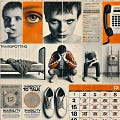Dear Companions,
Mid-week hi from me. This is a Munchkin Msg, mini newsletter, ~500 words, inspired by my tweets or Substack notes that get engagement. This one went a little longer because I got carried away, and honestly, I could fill a book on this topic alone. Hope you are having a mythic week.
There needs to be a D.A.R.E.-style program for autonomic dysregulation and autoimmune disorders in schools.
Here’s why.
Young people think it’s just a cool person staring out a train window to a great soundtrack. They don’t realize that a "breakdown" often means actual illness resulting in total dysfunction, requiring years to recover, and reducing life to doctor visits.
Did you know that fifty years ago, people didn’t connect Primo Levi's depression to trauma in the camps? Imagine not knowing that concentration camps cause lifelong depression.
That’s the level of catastrophic failure we face in understanding human physiology, the immune system, the nervous system, the mind-body connection, and more.
You might say, "Kids won’t be convinced of anything until they experience consequences." Not true. Look at smoking or drug use—graphic public health campaigns showing dead fetuses dropped smoking by 30% in fifty years.
If you argue, "Smoking is making a comeback," here’s the difference: people can still quit after years without serious issues. They quit knowing the end game. If someone quits at 30, their risk reverts to that of a non-smoker by 45.
In contrast, autonomic and autoimmune issues aren’t recognized until the red zone is entered. They can happen well before lung cancer or cirrhosis. The nervous and immune systems need care like any vital organ.
So why are we still addressing this threat with vague calls for “mindfulness”?
The nervous system is a credit system,
Resilience matters, but it’s inflationary.
Part of the problem is that so few stories get out. Stress worsens these illnesses, making relationships nearly impossible.
The other is this misguided idea that applying these lessons will eat at productivity. Actually, years of sickness in your prime will do that. It makes stress intolerable. Athletes understand this concept well.
Sure, maybe in the D.A.R.E auditorium the lessons will be ignored, but maybe some kid will remember them while staring vacantly at a mysterious rash ten years later.
A D.A.R.E.-style program could look like this.
Step #1: Show people the harsh reality of invisible illnesses.
Show what happens when the wheels fall off. Show the inability to handle the stress of a phone call, how a gluten allergy can expand to all food, how chronic fatigue can require a feeding tube, how someone with ME needs days of rest after a 10-minute walk, how a dysfunctional thyroid leads to a hundred-pound weight gain in months, what non-stop Long COVID headaches feel like with a toddler.
How them the heart rate spike with P.O.T.S., the dismissal by doctors, the denied disability, and abandonment by loved ones. Now show all of this in the life of a marathoner, a working mother, or a high-powered attorney at 35.
Step #2: Educate on warning signs
People ignore red flags for years—eczema, IBS, allergies, migraines, constipation, mild thyroid issues. Perhaps the body bounces back. Then, one day, it doesn’t.
So many young people are experiencing Long COVID symptoms—persistent coughs, stomach issues, brain fog. These symptoms can be a harbinger of severe burnout, especially with the added pressures of pregnancy or family responsibilities.
Must we wait for each generation to be flattened?
People-pleasers are at higher risk.
Step #3: Teach strategies, true health and recovery
A D.A.R.E.-style program could help young people learn the importance of true rest and repair—whether by heeding warning signals, detoxification, cognitive breaks, brain training, TMS, therapies or functional medical biomarkers. What do you think is key?
If a severe situation hits, they should know, there are many ways to recover. In part it will require traditional medicine, in part, functional and holistic. Attitude and mindset are both accomplice and opponent in recovery. Self-compassion and pacing will be necessary, to understand how to introduce new challenges, to train the system anew. And so on, into the Healingvrse…. they won’t be alone.
With much love from the Healingvrse,
Rebecca



